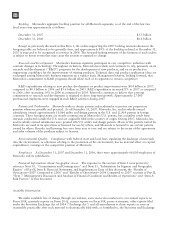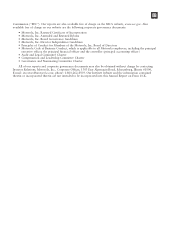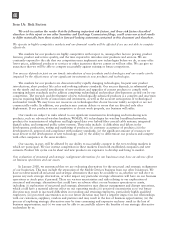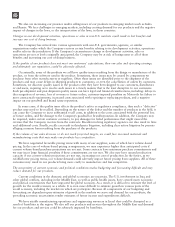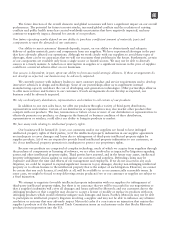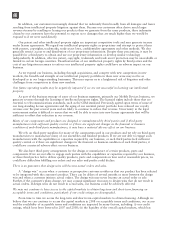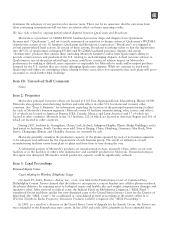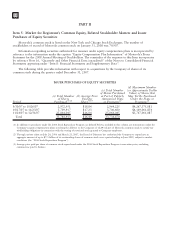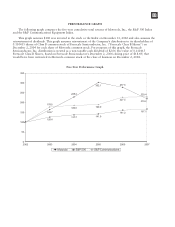Motorola 2007 Annual Report Download - page 33
Download and view the complete annual report
Please find page 33 of the 2007 Motorola annual report below. You can navigate through the pages in the report by either clicking on the pages listed below, or by using the keyword search tool below to find specific information within the annual report.
We may provide financing and financial guarantees to our customers, some of which may be for significant amounts.
The competitive environment in which we operate may require us to provide long-term customer financing to
a customer in order to win a contract. Customer financing arrangements may include all or a portion of the
purchase price for our products and services. In some circumstances, these loans, leases and extended payment
terms can be very large. We also provide revolving, short-term financing to certain customers and distributors that
purchase our equipment. We may also assist customers in obtaining financing from banks and other sources and
may also provide financial guarantees on behalf of our customers. Our success, particularly in our infrastructure
businesses, may be dependent, in part, upon our ability to provide customer financing on competitive terms and on
our customers’ creditworthiness.
While we have generally been able to place a portion of our customer financings with third-party lenders, a
portion of these financings are supported directly by us. There can be higher risks of default associated with some
of these financings, particularly when provided to start-up operations such as local network providers, customers
in developing countries, or customers in specific financing-intensive areas of the industry (such as 3G wireless
operators). Should customers fail to meet their obligations on new or existing loans, losses could be incurred and
such losses could negatively impact our financial results. In addition, our sales to such customers or distributors
could be reduced in the event of real or perceived issues about the credit quality of the customer or distributor.
We are exposed to risks under large multi-year system contracts that may negatively impact our business.
We enter into large multi-year system contracts with large customers. This exposes us to risks, including: (i) the
technological risks of such contracts, especially when the contracts involve new technology, and (ii) financial risks
under these contracts, including the estimates inherent in projecting costs associated with large contracts and the
related impact on operating results. We are also facing increasing competition from traditional system integrators
and the defense industry as system contracts become larger and more complicated. Political developments also can
impact the nature and timing of these large contracts.
It is important that we are able to obtain many different types of insurance, and if we are not able to obtain
insurance we are forced to retain the risk.
The Company has many types of insurance coverage and also self-insures for some risks and obligations. The
insurance market was disrupted after the events of September 11, 2001 and the 2005 hurricanes. While the cost
and availability of most insurance has stabilized, there are still certain types and levels of insurance that remain
unavailable. Natural disasters and certain risks arising from securities claims and public liability are potential self-
insured events that could negatively impact our financial performance.
Government regulation of radio frequencies may limit the growth of the wireless communications industry or
reduce barriers to entry for new competitors.
Radio frequencies are required to provide wireless services. The allocation of frequencies is regulated in the
U.S. and other countries and limited spectrum space is allocated to wireless services. The growth of the wireless
and personal communications industry may be affected: (i) by regulations relating to the access to allocated
spectrum for wireless communication users, especially in urban areas, (ii) if adequate frequencies are not allocated,
or (iii) if new technologies are not developed to better utilize the frequencies currently allocated for such use.
Industry growth has been and may continue to be affected by the cost of new licenses required to use frequencies
and any related frequency relocation costs.
The U.S. leads the world in spectrum deregulation, allowing new wireless communications technologies to be
developed and offered for sale. Examples include wireless local area network systems, such as WiFi, mesh technologies
and wide area network systems, such as WiMAX and LTE. Other countries have also deregulated portions of their
available spectrum to allow deployment of these and other technologies, which can be offered without spectrum license
costs. Deregulation may introduce new competition and new opportunities for Motorola and our customers.
Changes in government policies and laws or economic conditions may adversely affect our financial results.
Our results may be affected by changes in trade, monetary and fiscal policies, laws and regulations, or other
activities of U.S. and non-U.S. governments, agencies and similar organizations. Our results may also be affected
by social and economic conditions, which impact our operations, including in emerging markets in Asia, India,
Latin America and Eastern Europe, and in markets subject to ongoing political hostilities and war, including the
Middle East.
25



